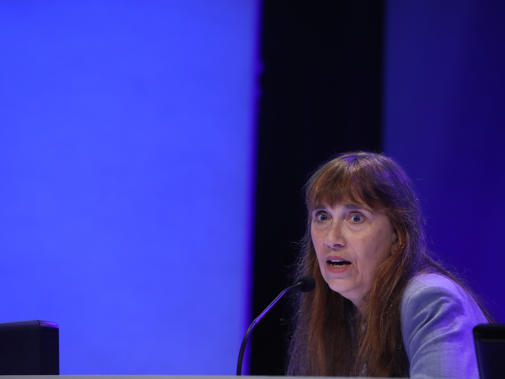‘Please end this burgeoning health crisis now, before it gets worse.’
There was little dispute among this year’s BMA annual representative meeting that widespread use of vapes – or e-cigarettes – is a growing public health epidemic. The question was how bold the action to reduce it should be.
Ryan Devlin, a specialty trainee 5 in psychiatry, set out the position when he introduced a motion asking the BMA board of science to re-review vaping and e-nicotine products.
He said: ‘Vaping can help you quit smoking, but those who have never smoked should not try it. Vaping is harmful.’
Dr Devlin noted how vaping can cause serious and potentially permanent lung scarring, breathing problems and addiction – and widen health inequalities – with the World Health Organisation in agreement.
He also pointed out how the number of never-smokers who are trying vaping is increasing, pointing to figures from Action on Smoking and Health (ASH) showing the rise from 4.9 per cent among adults in 2021 to 8.1 per cent in 2022.
Youth enthusiastic
Figures also show a rise in vaping among young people, added Dr Devlin. ASH figures also show 20 per cent of 18-year-olds, 14 per cent of 16 to 17-year-olds and 4 per cent of 11 to 15 year-olds using e-cigarettes in 2022.
‘We know the dangers,' added Dr Devlin. ‘Dangers that are exacerbated in young people – yet the proportion of young people using vapes is staggering. More so because young people should not have access to them.’
 VAPING: Popular with young people
VAPING: Popular with young people
Dr Devlin, who is based in Scotland, said the advertising of vapes, with flavours such as ice cream, bubble gum and watermelon and – often in colourful packaging – was clearly targeted at young people. He highlighted one example of a dessert shop in Glasgow also selling vapes.
‘We know this marketing is working,’ he said. ‘Far more needs to be done.
‘We must not waiver, must not compromise, allowing any room for these unscrupulous companies to sell these products to minors, which means condemning those people who fall victim to them to a lifetime of respiratory problems and addiction.
‘Without a clear position, the BMA is behind the curve.’
Children in danger
Elizabeth McElderry, a GP in north Devon, agreed with the dangers of vaping but called for more immediate action.
‘There’s a real groundswell now about increasing vaping among children. I’m concerned that the motion lacks a sense of urgency,’ she said.
Noting the wording of the motion was about ‘discussion’ rather than ‘implementation’ of change, she agreed research should be ongoing but believes legislation and education are ‘needed now’.
Dr McElderry also warned against the section of the motion which calls on the BMA to lobby to ban all e-nicotine flavouring, noting how flavours are also appealing to some adults who are moving from cigarettes to e-cigarettes.
‘A complete ban could make some of them even more reluctant,’ she added.
BMA policy
Callum Wood, a specialty trainee 6 in gastroenterology in the northwest of England, said he supported further research into vaping, but noted how the BMA board of science chair has already spoken publicly against vaping, with a detailed BMA position paper already published and available.
‘I don’t believe this meeting needs to micromanage the work of the board of science,’ he said.
Dr Wood also questioned the section of the motion calling for the BMA to discuss stopping the illegal sale and proxy purchases of vape pens and other e-nicotine products to people under the age of 18 – because it’s already illegal to sell e-cigarettes to under 18s.
Penelope Toff (pictured, top), chair of the BMA public health committee, agreed the need to take action on vaping is ‘urgent’ and that the evidence is ‘already overwhelming’.
But she said the motion would ‘formalise’ the BMA position, and while ‘could perhaps go slightly further’ it ‘will be a starting point’.
Dr Devlin warned that previous battles against the tobacco industry took many years and said having policy firmly in place would help win the battle with e-cigarette companies sooner.
Doctors' oath
Naabil Khan, a medical student in Exeter, asked doctors and medical students to consider the Hippocratic Oath when voting.
‘How can we allow the continuation of e-cigarette promotion and expansion while also acknowledging that these products have implications that we haven’t fully explored or discovered?’ she asked.
‘How can we not support this motion when we don’t know the full extent of the impact these products can have on our populations and patients?’
Noting known effects like asthma, lung scarring, organ damage, addiction, cancer, she said ‘the list of potential harms caused by vapes and e-cigarettes is extensive and could continue to grow as further research is conducted'.
Ms Khan said information sharing, inhibiting promotion of vapes and doctors taking histories of patients’ e-cigarette use will all help.
‘We have a role and duty to protect our populations,’ she said. ‘This can only be achieved through strong and sustainable additions to policy which ensure we address this growing epidemic.’
The motion carried, with 91 per cent voting in favour.

